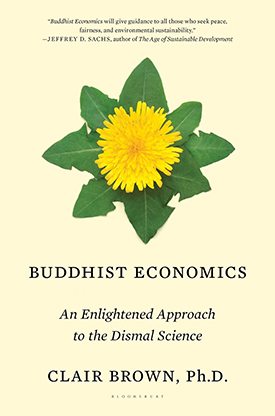Buddhist Economics
An interview with economist Clair Brown
By Sam MoweThe term “Buddhist economics” first appeared in E. F. Schumacher’s 1973 book, Small is Beautiful: Economics as if People Mattered. In her new book, Buddhist Economics: An Enlightened Approach to the Dismal Science, Clair Brown builds on Schumacher’s understanding of the term while focusing on what she sees as our two biggest economic challenges: global warming and inequality.
The Buddhist economics approach to each of these challenges is based on two assumptions: that we’re all interconnected with each other and that people are interdependent with the natural world. Once we make these assumptions, Brown argues, a free-market approach to economics is no longer adequate because it prioritizes individualism. Buddhist economics, by contrast, requires us to care enormously about how everyone is doing because our well-being is interdependent.
Brown is Professor of Economics and Director of the Center for Work, Technology, and Society at the University of California, Berkeley. We recently spoke with her about ways to bring Buddhist ideas into our economic system.
As a professor of economics and a student of Buddhism, you write of grappling with “the troubling disconnect between free market economics and the issues of the real world.” Can you describe this disconnect?
The free-market model assumes that all people care about is buying more stuff. It ignores all the important things that psychologists have told us make us happy, such as the fact that we really care about our relationships. We care about raising healthy children. We care about contributing to our communities. These are the things that create a meaningful and happy life, but, in free-market economics, helping others isn’t part of the model.
 In Buddhist Economics you write that the “free market model puts a high premium on individualism and self-centered freedom.” Can you say more about how different types of economic systems make different assumptions about what matters most in life?
In Buddhist Economics you write that the “free market model puts a high premium on individualism and self-centered freedom.” Can you say more about how different types of economic systems make different assumptions about what matters most in life?
Well, almost all economies are capitalist economies, meaning they bring together markets in which people own some private property, the government provides some services, and the government sets the rules by which markets operate. Within this we have what political scientists call “varieties of capitalism,” and the big question that they have to answer is: What’s the role of government? How does the government set up, structure, and create an economy that will perform in the way that the society wants?
One of the main things that economists have taught us is that societies choose their level of inequality. That’s a very important point. We have to decide whether we are going to share prosperity or whether we are going to let the rich take home most of the income. Inequality varies enormously across advanced economies. The other big issue that societies have to address is how to approach externalities, which are costs or benefits that affect those who did not choose to incur those costs or benefits. One of our biggest externalities is carbon emissions, which are causing global warming. Economies pick their level of carbon emissions. The level of carbon emissions also varies enormously across countries with advanced economies.
So levels of inequality and carbon emissions are measures that we can use to show what we might think of as our social values—although, of course, there’s never just one set of social values in a single country.
Let’s talk more about things we might measure to achieve a more just economy. You write, “Buddhist economics focuses on activities and experiences that don’t have a price tag.” What kinds of things are you talking about?
To an economist, to measure something means that you pay attention to it. If you don’t measure it, you tend to ignore it. So that’s why we think that you actually can have an impact on the way people behave and think by what you’re measuring in terms of economic performance.
Of course, a free-market model thinks that anything that’s valuable is bought or sold. So, unfortunately, almost all market economies only use a national output or income to measure economic performance. What that means is that the only things that are valued in the economy in today’s gross domestic product or GDP are things that are bought and sold in the marketplace.
But there’s no price tag that shows the true value of certain experiences. Let’s say you take a walk outside on a gorgeous day and you appreciate the flowers, the sun, and the magic of the moment. You spent no money on that walk so it wasn’t recorded. What’s the value of your experience sitting on a cushion? Well, at some point you bought a cushion, so that was recorded in national income accounts. But since then, you didn’t spend any money while you sat. So there was no value to the national economy for any time that you’re sitting—even though, to you, it might have been deeply valuable.
If we are only valuing things by how much money we spend, that doesn’t tell us anything about the value of our lives. There’s a complete disconnect.

How might we incorporate these kinds of experiences into our economic model?
That gets a lot harder. Usually what we do is we take a two-pronged approach. One is that we at least value time off and time to have experiences that are important and meaningful to us. Economists aren’t very good at figuring all this out, but we’re trying. Then we ask how you’re feeling about your life, how satisfied you are. Polls ask thousands of people around the world now: How satisfied are you with your life?
The only problem is that you can’t really tell to what extent people are actually suffering from how they answer that question. You end up having people with very low incomes being quite resilient and saying, “Oh, life is okay.” And then you have people with very high incomes also saying, “Oh, life is okay.” So even though asking that question is one way of trying to tap into how people are feeling about their life, it still leaves something to be desired.
As an economist, I like the idea of asking very specific questions of people so that we can get a clearer sense of their opportunities, capabilities, and the main problems that are making them suffer. When you do this, people can tell you what they would like to have different about their lives, which is real helpful. In fact, the country of Bhutan found that this was true. When they asked people about very specific things, they found out that the urban people needed more time away from work and that people in the rural areas were really suffering from not having adequate food and shelter. They found very different problems that were causing people to suffer or not do as well as they might, depending upon if they were rich urban or poor rural.
Can you briefly describe Schumacher’s vision of a Buddhist economics in Small is Beautiful? How does your approach build on his?
Schumacher’s Small is Beautiful started with the right livelihood, part of the Buddhist eightfold path. He said, basically, “If there’s right livelihood, then surely there’s right economics.” He built on that to explore the role of meaningful work in people’s lives. Then he went a step further, arguing that it is very important to consume in a way that doesn’t hurt the earth. He didn’t put it quite that way, because we weren’t into the idea of sustainability yet, but he basically said that you should consume by using the fewest resources.
I thought that all of that was wonderful, but it needed to be modernized. Small is Beautiful was a bit dated from a female viewpoint because he said, “It’s good when women stay home and take care of the children, and the men go out and work in a meaningful job.” Also, today we need to make Buddhist economics more global. How can the rich countries come together through the UN and really reduce suffering—especially from starvation, lack of clean water, lack of sanitation, and lack of shelter? We have so much need around the world.
When I teach my students about Buddhist economics, I use pies as a metaphor. In the free-market economy, the most important thing is the size of the national income pie. After that, most economists care about the division of the pie. How can we divide the pie in a way that makes it more equitable? How can we share prosperity? In Buddhist economics, there’s one more step, which is to ask: What’s inside the pie? What makes life meaningful? How do we measure it? What’s in the pie, of course, includes the natural world and our relationships with each other.
Sam Mowe is Editor in Chief at the Garrison Institute.

Reading this I felt discouraged because in our culture most citizens wouldn’t be interested in anything labeled “Buddhist” and they might even feel antagonistic. I think it might be incredibly valuable to rethink this from the prospective of “spiritual economics” or even “Christian economics”, i.e looking first for the elements of relevant Buddhist ideas that are present at the deepest level in Christianity or Islam or Judaism. Then we would have a debate with free market consumerism where most people could relate to the opposing view as being connected to their own deepest beliefs. You’re not going to convince the frightened bigots very easily, but most of us have the roots of Buddhist understanding available to us in non-Buddhist language at our very core. The life of the planet is more important than winning converts to Buddhism.
Love this! Your absolutely right, and I completely agree.
What needs to be done to put this into action though, is find a way to create incentives for the producer and the consumer to start producing and consuming more conscious and sustainably.
Explaining why it is so important is key to getting people aware, but incentives will be the key for action. As well as convenience and simplicity.
I think the idea of ‘what’s in the pie?’ Is most likely to influence a majority of people. Promoting life enhancing experiences – encounters with the natural world, the deep satisfaction to be found in just being, the joy of relationships when we finally learn to love and accept ourselves – eating these pie fillings will automatically promote more equality and care for the planet.
What we need is more ethical leaders in business and politics over here in the West. You will begin to see a huge shift if this could happen. In this day and age it seems that people want to escape from problems through watching awful reality shows and with destructive habits. Why are those shows on tv in the first place? For awhile the message was work hard and you will rise to the top but many began neglecting their families in the process and others hide behind work and work late. The children suffer and then the next generation suffers as well. Then a whole generation is messed up. This is about our future and the future of the world too. If people don’t start to become less selfish and think in terms of “is what I’m doing helpful or harmful” then things will get worse and I think it has already started to in some ways. There is still a chance for change though. I see young people realizing that things are bad and wanting to do something but don’t always know how.
The media is another problem especially in the west. Better leaders there too would make a huge difference also, poor behavior is often overlooked these days because people can’t be bothered to deal with problems… this is not everyone but many do this. Drastic changes are needed. We need to value intelligent, visionary, empathetic leaders and not toxic and entitled. Why do people who manipulate and scheme their way to the top stay at the top?
Lastly, about children: shy and quiet children in the west are bullied in schools and at times are made to feel like something is wrong with them by adults or their peers, we need to teach our children how to value these types of people because they are insightful ones who can actually make a world of difference if we don’t make them feel small throughout their lives. Teach them all how to work together even though they are all different and as adults maybe they can teach the world how to come together better. It is an uphill battle in the west but progress has happened. Take Google for example, they’ve completely changed the work environment and have integrated meditation into their workday. More needs to be done. I hope more people realize this and take small steps to create a more positive world.
This interview highlights some important points, but is silent on one core issue – the predatory, unfair and speculative aspects of financial capitalism. Buddhist economics is about long-term well-being of people and planet, and developing sustainable conditions for right livelihood in a non-violent way. We also need to look deeply into the matrix of three mind poison of greed, hate and ignorance and how they have been institutionalized by the privatized debt-based currency and centralized commercial banking. Why money is readily available for war and speculation and not for real needs of people and planet? Our greatest challenge also offer us a great opportunity to shift from the vicious cycle of Market Economics to virtuous cycle of Life Economics.